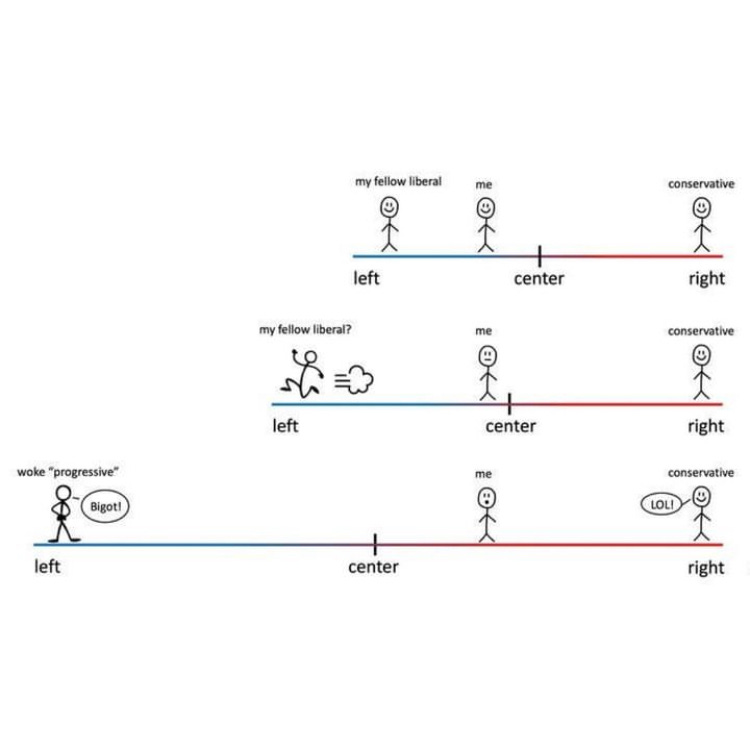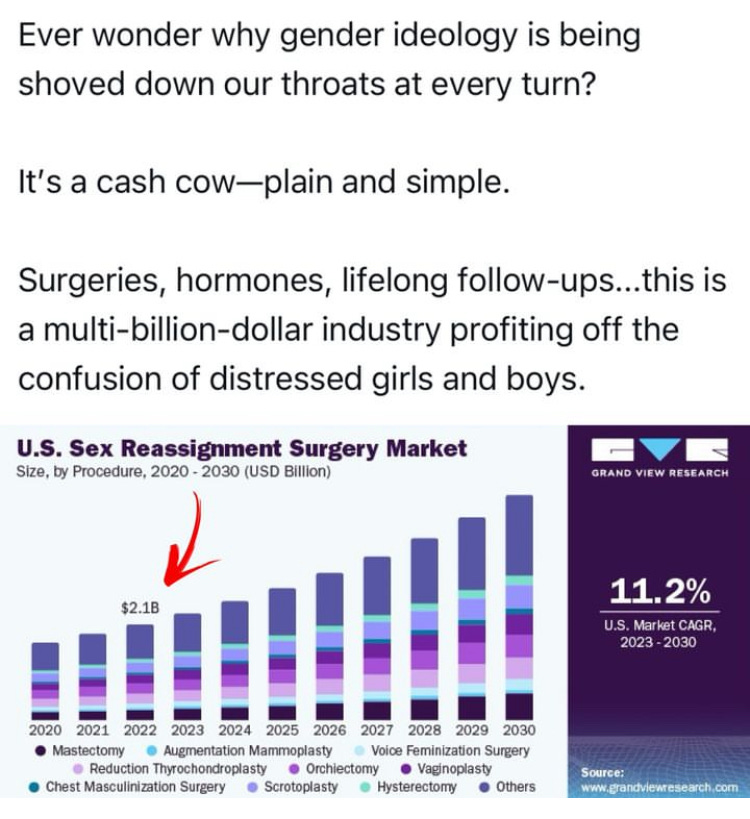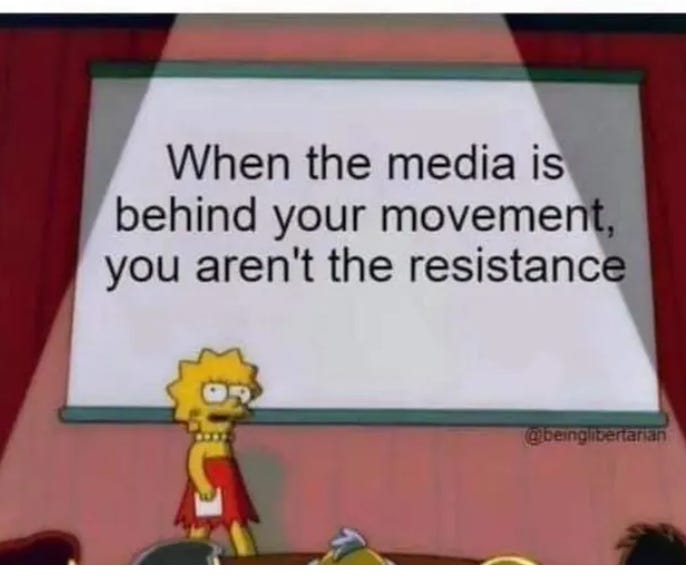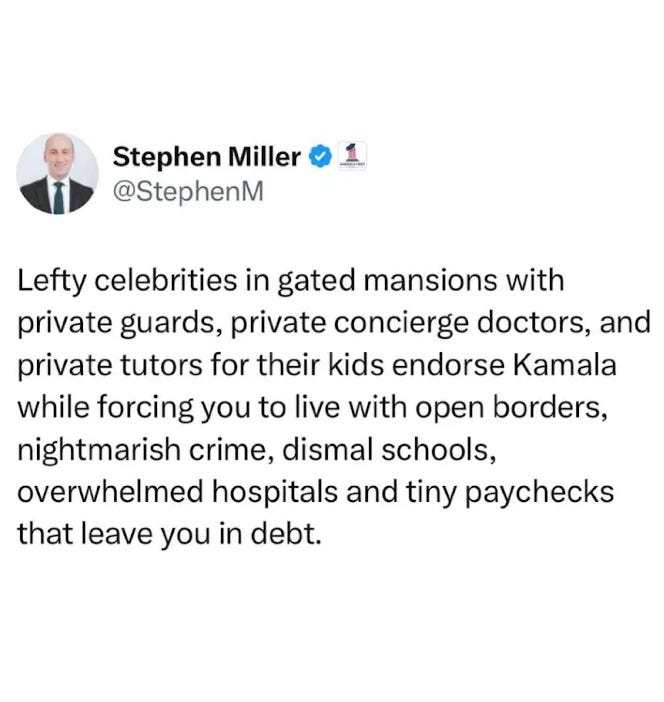Historically, this kind of intra-elite competition keeps escalating until things get violent and ugly. Those who’ve been dethroned won’t go into exile willingly. They already sold their souls to the devil for the power they think they’re owed, and there is nothing they won’t steal, kill, and destroy in order to get it back.
-
The biggest political trend of our era is one that few news programs are willing to cover: the elite class (educated and privileged people who are sheltered from some of the vagaries of the employment market, who don’t work with their hands, and who benefit from high-status jobs and degrees) is splitting. THIS is the dynamic which is making our society feel jubilantly off-balance and uncertain. Every society relies upon its elite class to give it direction and values, and to provide rulers and thinkers and administrators. Ours is now fighting between two sides, who are roughly arrayed around one issue (and dozens of sub-issues): is ‘the West’ a good model for the future? Or is it not?
The outcome of the fight will determine the shape of world history, and from this struggle a new synthesis will emerge. It always does.
The Science of History & the Science of the Present
Political science is not really a science at all, despite the formulas and diagrams (example below) which often accompany polisci academic work. At its best it is…
The meaning of this box chart is an idea which could have been represented in 2-3 clearly worded sentences, without jargon or graphs or flowcharts… but it would then seem less scientific. I get it. The feeling of expertise is mildly intoxicating.
…integrated with other disciplines (economics, demographic statistical analysis) and forms a workable picture of reality. The true handmaid of polisci is and always has been history. Polisci is a wonderful tool for those who want to understand the flow of political and cultural currents over time and through human societies. There’s no answer to any equations (no proper equations at all, really) and any graphs or box charts must be understood as rough approximations. Based on a person’s assumptions and framing, almost any conclusion is potentially flawed. There are few certainties in life and the only constant is change.
Nevertheless, we can see some very clear patterns and identify some (conditional) rules. One of these is that the poor do not create revolutions, and they do not often benefit. There’s a general idea that a revolution is an upending of the power structure, such that the “last become first and the first last” but this is nearly always incorrect. It’s about as far from the truth as any description of the change to the status quo can be. Rather, revolutions use the desperation and anger and human energy of the lower classes. The proletariat’s situation has become intolerable (or at least no longer tolerated) and they have shifted their mass against the regime implacably. They’ve now taken sides against the status quo and the fire of political promise and economic justice has been lit. The ‘lumpenproletariat,' afflicted with mental illnesses and physical malformations and much higher rates of addiction and dysfunction and idiocy, sometimes hunkers down and waits for the new order to take shape, knowing that it will still be on the bottom in any case. In certain cases, they join the revolutionaries out in the streets and revel in the freedom of chaos.
Even the most destructive revolutions are motivated by promises and ideas, though. Who provides the guidance to the proletariat? Who shapes their dissatisfaction into a new program and organizes the new structure?
In many cases it is the elites who do this. It’s not the regime but it’s different groups of educated, privileged citizens, with their own assets and prerogatives. That is one reason why young revolutionaries so often have upper middle-class or rich parents and/or have spent entire decades at elite universities (not the typical attributes of laborers or farmers or soldiers). Fidel Castro, Pol Pot, Che Guevara, Vladimir Lenin, Mao Zedong, Pierre de Beaumarchais… The poor are busy trying to survive. It’s only the middle class and above that have time for cultural experimentation and political theory.
Social Strata and The Parasite Class
Every society is different, and so every revolution and every reform movement is different. It’s quite possible that the developed world has moved away from the possibility of mass revolution, as our birth rates fall and our societies become older and weaker and more stratified. Nevertheless, we are witnessing a spasm of elite confidence and self-identification right now. That spasm has been most striking and most productive in the United States.
Our country is the richest nation that has ever existed. We have a government which takes enormous sums of wealth-trillions of dollars per annum-out of the productive sectors of society and redistributes it to clients and captive institutions (hospitals, universities, non-profits, media companies, contractors, government agencies). We also have a social structure in which the elite are almost completely insulated from interaction with their inferiors. This became shockingly apparent in the final days of the second Trump campaign in 2024, when millions of worried and bewildered upper middle-class Twitter creatures displayed their ignorance: how could people be turning to Trump, after all he’d said and done? Why would people be expressing disgust with the power arrangements of our society?
In the 21st century, the left-wing American elite is so out of touch with ordinary people that we probably have forgotten that this was not always so. But during World War II, members of the aristocratic class like John F. Kennedy and the elder George Bush risked their lives alongside regular Americans. Lyndon Johnson, for all his flaws, at age nineteen spent a year teaching at a school that served poor Mexican-Americans.
When I was a boy in the early 1960s, although both of my parents were college graduates, my friends were the children of blue-collar workers. This was decades before what Bill Bishop called The Big Sort took place. Today, college-educated Americans and Americans who have never been to college inhabit different neighborhoods. In a sense, they are worlds apart.
In the 1970s, everyone experienced gasoline lines and suffered from inflation. In 2008, the banks were generously bailed out while the rest of the country went into recession.
When the pandemic hit in 2020, the laptop class adapted easily by working from home. Teachers’ unions shut down schools, making parents have to supervise their children, whose Zoom schooling resulted in learning loss. The authorities overstated the powers of the vaccine to prevent illness and keep it from spreading. They blamed and shamed the people whose jobs would not allow them to lock down, but without whom the white-collar professionals would have had no food to be delivered to their doorsteps or electricity to power their Internet connections.
When the George Floyd protests arose, the elite chanted “Defund the police,” a slogan which fell flat with the people most affected by the rioting. Terms like “preferred pronouns,” “gender-affirming care,” “migrants,” and “Latinx” were widely used by the college-educated while having no purchase with everyone else.
In Europe, the elites took their cues from their American counterparts, ignoring the sentiments of their own people. The reaction of British politicians to the Brexit vote was predominantly denial.
If you get into a disagreement with your spouse, the worst thing you can do is refuse to listen to the other person. But that is exactly what the elites have done, dismissing opposing parties as racists, fascists, and a “basket of deplorables.” Rather than listen to other points of view, they have cried “disinformation” can called for censorship.
-
These might be surprising questions, coming from people whose education and cultural attitudes are all about interrogating power structures. I’ve written plenty elsewhere about this paradox, but I’ll try to address it once more here.
Our elites went to schools and gained jobs on the backs of hard-working and less privileged people. Many of those jobs didn’t provide enough economic value to justify them, but the entire system was propped up by an extensive network of patronage and parasitism. These kinds of blood-sucking dynamics run all through our system. For example, carpenters and police and truck drivers are taxed to provide subsidies to universities (through FAFSA and research grants and DEI initiatives and a hundred other routes). The federal government arranges and guarantees student loans, which inflates the cost of universities, securing even more money for them (endowments of hundreds of millions of dollars are very common). The universities pay their professors (many of whom do very little work-some of them contribute nearly nothing to society) and a growing legion of administrators and consultants and ‘researchers.’ Every link in this chain is bloated and rotten. The professors are idle and conformist, parroting whichever fashionable orthodoxies are required to keep their lucrative sinecures (meaning that honest and incisive and brilliant people tend to wash out). The administrators are almost totally worthless… and there are 20x too many at elite private schools (many thousands, just in the Ivy League). The campuses get regular dining facilities and fitness centers and lounges and (sometimes segregated) lush new dorms… because what else can soak up that amount of money? Meanwhile, the central mission of education is mostly neglected. Strange new ideas are systematically rooted out and nonconformists are cowed or eliminated. A system which pays lip service to interrogating power dynamics becomes the most pervasive and vigorous guarantor of class privilege. By requiring social workers and researchers and journalists and administrators to get degrees (now often master’s degrees) all of those students who don’t have the time or wealth to exit the job market for years are precluded. These schools could offer generous programs to pull in children of the poor and the working class, but (to my knowledge) they never do. A palace of concern for the poor and the marginalized has been erected, full of the rich and guarded by expensive private security forces. Hundreds of yards outside the campus gates the poor and the working class live, and the universities do absolutely nothing for or with them. The institutions continue to absorb their wealth, year after year. They create a class of people who believe that their opinions and their degrees have made them compassionate and enlightened. What a relief that they don’t have to sacrifice anything for these people who they (theoretically) care so much about! When they buy uses or enroll their kids in school or compete for jobs they will use the credentials and status signals which the system has bestowed upon them, shutting out the laboring classes and their kids while pretending to be animated by egalitarian sentiments.
Every sector of American life has these kinds of dynamics now. Homeless advocacy is choked by 6-figure consultants and non-profit executives and college graduates. None of them have ever been homeless and none has ever lived in a neighborhood with homeless people or will ever live in such a neighborhood. Immigration advocacy is full of ten-million dollar federal contracts to house and feed and support a group of people whose presence in the United States is profoundly unpopular. Again, the elites pretend to adopt their stance on the basis of compassion, but an open borders policy entails massive benefits for them. Not only the grants and contracts but the possibility of cheaper goods and services. Their kids will never have to compete with this unpredictable and lawless underclass. Medicine is centralized beyond all historical precedent, billions being siphoned off for pharmaceutical companies and hedge funds and insurance executives, while a byzantine thicket of regulations bar any new entrant, or any doctor who wants to open their own office and care for patients. Taxes, regulations, conformity, payoffs, contracts, assent, hypocrisy… cowardice. This is the shape of the society we’re creating, and everyone can feel it.
All of this wealth comes from somewhere. It comes from the ordinary people who go to work every day and build things, stock shelves, pick crops, fix cars. This is the laboring class, and their message to the elites (growing louder with every day) is: stop taking our money. The pretext of federal legislation or grant or agency contract is wearing quite thin. The laboring classes are sicker than ever before. Mental health has plummeted. They’re further removed from political power in the world of these elites (which is by design), and their kids are mostly shut out from elite schools. Do the white working classes not understand that their kids will face de facto discrimination when applying to UCLA? Do black laborers not notice that illegal migrants get rent subsidies and cell phone plans? Do factory workers not see their downtown areas falling into disrepair while gleaming buildings rise on the nearest state school campus? Do suburban property owners not clock the effect that bail reform (at the behest of the most privileged and powerful international operators, like the Open Society Foundations and the financier Lords of the Earth) and pared-down police presences have on their home values? Of course they do. Everyone can see what’s going on. The elites have mostly shut their eyes to the reality, and this is easier since most of the elites really don’t know any working class people. How strange, to have a super-wealthy professional class, whose identity is based around egalitarian principles, fiercely defending their payouts and their class privileges and their status bonuses…
The Schism of the Elites
For egalitarians it’s an uncomfortable reality that our laboring classes could stay dissatisfied and exploited forever, probably. Nothing would change because our system is erected to marginalize them. The workers are simply not close enough to the levers of power. Those levers are controlled by people who claim to want to help the marginalized, but what this means in practice is to give the marginalized speeches and transfer payments and crummy schools-not power.
Of course there’s a fair amount of intergenerational dynamism in the United States, and working class and poor people enter the elite group all the time. But before they do, they must complete a years-long training and indoctrination program (college). The beliefs and values that these people were probably raised with (men and women are fundamentally different, being a good and kind person is of paramount importance, America is a blessed and insanely productive nation, merit is the best basis upon which to choose workers and managers and winners-not race) will be beaten out of them, through social pressures and repetitions and appeals to authority. Even their hometown ideas remain, these people will learn that expressing their beliefs in any meaningful way will ostracize and penalize them, especially in terms of status. They can believe whatever they like, but they will understand the penalty of stating their beliefs around their social betters and so they will remain silent, sometimes for life.
Complaints about academic orthodoxy tend to focus on penalties and absurd curriculum materials and faculty cancellations, but the problem is more fundamental. People are often not allowed to openly debate real social questions, and a culture of careful dogmatism is imposed. How many millions of students have quietly assented to ideas which they find ridiculous?
Nationwide, ~40% of students report self-censoring during campus discussions, according to a 2025 FIRE report
Polls indicate that most students feel that they can’t always discuss their authentic beliefs in class. It’s hard to imagine how this could be the case if there wasn’t some regime of discouragement and soft penalty. The fact is that the universities have created and spread the recent ‘elite consensus’. In reference to the commonsense moral and psychological beliefs of our hypothetical working class kid, the ‘right’ answers (the only ones which will be validated, and in some cases tolerated) are:
Men and women are fundamentally different → sex is an ambiguous and socially generated construct and gender identity is the real factor here. Gender identity jumps, straddles, and blends sexes so that ANY statement about ‘men’ is suspect (unless it’s a negative generalization about them). Any hint that women are, on average, deficient in any sense will be harshly rebuked. Women are only distinguishable from men because of society’s definitions and any reference to evolutionary biology or zoology (as analogy) or sociobiology will be immediately suppressed. I don’t think that I’m exaggerating.
Being a good and kind person is of paramount importance → ‘good’ and ‘kind’ are constructs hopelessly corrupted by traditional beliefs (i.e., racism, sexism, homophobia, transphobia, etc.). The premier moral duty of a person lies in forming the correct opinions and in punishing those who don’t share them. In the name of ‘tolerance’ a student is to develop a distinct intolerance for cultural attitudes shared by 80% of the people on Earth.
America is a blessed and insanely productive nation → America is a racist and sexist and genocidal and homophobic and transphobic empire. Any attempt to depict its past (or any European country’s past) in a nuanced historical context or to focus on the wrongs or errors of the ‘victim’ groups will be immediately castigated. Cultural and economic comparisons between the U.S. and other places won’t be introduced or validated. Cultural comparisons are off-limits, unless they’re made to criticize men or white people or the United States. Economics is simply not taught (unless you’re in an economics class-the information is firewalled and rarely allowed to infect sociology or history or ethnic studies departments). The implications of any exploration of market dynamics are too awkward for utopians and self-described Marxists, so they remain undiscussed.
Merit is the best basis upon which to choose workers and managers and winners-not race → merit is equivalent to white supremacy. Equity is the only valid priority when it comes to hiring and training and education, and the more equity the better. Merit = bad; equity= good. (This might sound formulation might seem simplistic but it is absolutely reflective of my experience in these spaces). Even in contexts where white people or men are profoundly disadvantaged (‘marginalized’ as the believers would say) equity should be pursued with zeal. Group traits are of supreme importance and elevating victim groups is always appropriate and should never be questioned.
Can anyone who has spent time in high-tier liberal arts or social science or gender studies programs really claim ignorance as to the picture I’ve painted? Can anyone say that these ideas aren’t popular in the academy? Of course they are, and their supporters continue to pretend to be confused when people discuss academic indoctrination. If we allow that these are faithful renderings of the ideology which reigns supreme at our colleges and universities, can you see why people who are taught to believe these things might find themselves unpopular within mainstream America? I won’t address the merits and demerits of these beliefs here (I’ve done that extensively elsewhere) and will limit myself to one general observation: it’s not the discrete claims and ideas which are so maladaptive to lawyers and social workers and therapists and journalists as they filter out into the job market. Rather it’s intellectual tendencies and assumptions (which are much more deeply rooted):
History is simple and moralistic
Tradition is basically worthless as a source of truth or goodness
‘Victim groups’ demand special care and allowances
People should be judged on the basis of the opinions they advertise
Questioning assumptions is dangerous… indeed, it’s immoral
The elites (newly molded or, more likely, class inheritors) who come out of these institutions won’t question any of the deep assumptions they’ve been taught because they haven’t been taught how to and, more fundamentally, they believe that questions in these veins are racist or sexist or xenophobic, etc. This is a total moral perspective masquerading as a political attitude. We’ve literally taught millions of young people that examining history with an open mind or scrutinizing sources or using logic is bigotry.
There are many absurd ideas which are popular among the elite class. The concept of ‘luxury beliefs’ is quite applicable and will instantly be recognizable to anyone who moves through elite spaces. For the purpose of this essay, though, all of the nonsense must be distilled into a single overarching claim. Gender ideology, equity, multiculturalism, forth-wave feminism, Critical Theory, climate alarmism-they must be united around a central proposition. That proposition is the idea that the West is an invalid and pathological social model. That’s it. If you believe this then you are a member in good standing of the elite orthodoxy (I’ll call them ‘the orthodox’ henceforth). Almost no one who is a member of ‘the orthodox’ isn’t elite. There’s simply no widespread subscription to this view among the laboring classes. If you believe that the West is the best social model which has ever been created (a belief that often correlates with respect for tradition, market dynamic, the sex binary, science and skepticism, Judeo-Christian ethics, Western philosophy) then you are in the opposing camp. You are probably a working class or non-elite middle class person, but you might be elite. If you’re a believer in this latter claim and you are a member of the elite then I will subsequently refer to you as ‘a subversive’.
How did we get to a place in which our elites subscribe to a completely different worldview and status hierarchy and historical conception and psychological model and ethical framework from everyone else? It wasn’t debate and persuasion. I can tell you that. The answer relies on Critical Theory’s capture of our institutions of learning and the extreme focus that elites put on status and conformity, and the distance at which the privileged now live their lives from the hoi polloi (allowed by segregation and technology and traffic patterns and real estate priorities and a hundred different factors). For now, it is enough to observe that the elites are discontent. The orthodox are fighting a rearguard action against the subversives, and the subversives gain energy and validation from the wider society, who are in broad agreement with them. The second Trump administration is helping too of course. We have a group of people committed to upending power structures and empowering the marginalized, fighting an ideological struggle in order to protect their wealth and status against the marginalized of their society. The people whose worldview is ostensibly centered around remaking hierarchies are fighting to preserve the hierarchy that they rule. The same fight is happening (with national cultural and historical variations of course) in every Western country.
Elon Musk, Bridget Phetasy, Amala Ekpunobi, Bret Weinstein, Jonathan Haidt, , Tulsi Gabbard, RFK Jr., , , , Michael Shellenberger, , , , , , Joe Rogan, etc. etc.
The preceding names are all notable subversives-members of the elite class who are begun a reactive wave to return with they regard as effectiveness and ethical soundness to our institutions. They are varied in their approaches and convictions, but they are all members of the elite class, they were all (until less than a decade ago) convicted and outspoken liberals, and they are all now invested in the project to return our status quo to traditional focuses and metrics: scientific rigor, color blind utilitarianism, classically liberal and libertarian approaches, and open discussion.
If regard for the Western cultural and political tradition is the defining core belief of the orthodox and subversive wings, then the right to express oneself freely without state control or oppression is surely it’s defining practical policy measure. If you believe in the right of a person to state or question or criticize any belief without fear of censorship or retribution, then you’re probably not orthodox. If you want to limit or vanish this right (on the basis of protection from hate or epidemiological effectiveness or science or accuracy) then you probably are, regardless of whatever else you might believe. The orthodox do not want a lively and open contestation of ideas, in theory or in practice. That’s why they tend to hide behind institutions and credentials and scientific journals as much as possible. They complain about misinformation endlessly… yet almost never agree to debate skeptics in public forums. In many cases I suspect that they regard such debate as somehow beneath them. Remember, this isn’t just a fight over ideas-it’s a class struggle, which implicates our entire system of status and privilege.
Institutional Ferment
The fundamental change in our society has been a distinct leftward swing within our elite institutions over the past 20 years. This swing has (collectively) carried women, the wealthy, and those with graduate degrees (who operate within status-centered organizations and are more concerned with appearing virtuous and having the ‘right’ opinions). Most people, unblessed by exorbitant privilege, have remained untouched. We still persist in believing that America is a special place, that fairness and merit are important, that capitalism is beneficial on net, and that things like marriage and children and religion are vital to the social fabric.
The trendline for men remains totally flat
Young women have become significantly more liberal over the last decade, while young men have stayed relatively stable. This leads many to fear that as young men are resisting the tides of change, they may be vulnerable to far-right groups. There doesn’t seem to be an equivalent fear about young women. Probably because young women who adopt extreme political views are less physically dangerous, and have historically not been responsible for as much political violence as men. Still, I am intrigued at how uncurious people are about why women have moved so sharply to the left and focus more on young men who have largely remained politically stationary..
-
Your estimation of this political shift will of course depend upon your current location on the variegated spectrum of political belief. Let us consider, though: biological men with the gender identities of women, placed in women’s prisons; heavy taxes and regulations on the poor to address climate change; generous donations and a distinct lack of scrutiny or debate of the Black Lives Matter movement/organizations; draconian COVID-era restrictions on business and travel and education (including for small children); celebration of a media ecosystem which has been partially funded by the federal government and which crafted a narrative of rightwing ‘conspiracy theories’ around Joe Biden’s decline; the ‘Twitter Files’ and the revelation of pervasive-and secretive-federal interference in free expression; bail reform and its rarely-discussed but catastrophic effects; U. S. border policy from 2020-2022; etc.; etc.
Surely, we can now agree: college degrees don’t automatically imbue a group with good policy-making sense.
The elite schism is driven by the rise of new institutions and the collapse of old ones. The shocking degradation of the legacy media is old news at this point. How curious! If CNN admitted that they had been blinded to certain political realities and invited new YouTube personalities onto its network it would instantly gain purchase with the young, and with independents. They won’t do this, however. Thay can’t. Their class blinders are too fixed and their ideological imperatives too overwhelming. When people who’ve spent a decade getting most issues wrong can’t admit their fallibility, it’s difficult to escape the conclusion that they deserve their fate, whatever it might be.
A college or university closes every two weeks in the United States now (this has more to do with our cratering birthrate, but still). The USAID review is tightening the spigot on a global system of captive media and a massive slush fund of ideological promotion… The University of Austin (UATX) and Heterodox Academy and FIRE and the recently-liberated space of X (Twitter). The list of corporations who have seen fit to publicly proclaim their abandonment of DEI and similar political initiatives (illuminating the fact that these programs have been burdensome for the companies and that the winds seem to be decisively shifting against them) grows daily. Users flock to YouTube, where free expression is still strictly curtailed in favor of China and the orthodox, and Substack, where it is not.
You can expect to see a profusion of new platforms, institutions, and ideas in the coming years. Nearly all of them will be run by subversives. The orthodox are losing. While they still hold the bulk of institutional power they have erected their worldview as a dogma, and in a free society dogmas invite their own dissolution. The idea that gender ideology or equity or Critical Theory were such timeless notions that they could freeze history and reign for a thousand years, without mockery or dissent is the kind of formulation that can only be created by a group of people without any knowledge of history.
Synthesis
:The pessimism of recent years naturally generated an interest in cyclical theories of history – the empirical Strauss-Howe model of generational turnings, Turchin’s mechanical cliodynamics with its elite overproduction and wealth pumps, Spengler’s mythopoetic conception of cultures as vast organisms whose lifecycles progress through predictable seasons. Hard times make strong men; strong men make good times; good times make weak men; weak men make hard times. Whichever model one favours, the invariable conclusion is that Western civilization is in its terminal winter – fragile, ossified, decadent, corrupt, exhausted, and doomed. Desolation awaits.
Neither the subversives nor the orthodox will ‘win’ their struggle. It seems clear that time and momentum are on the side of the subversives, but the orthodoxy will remain, in the corridors of power and in federal agencies and in weird and dusty corners of academia. Those ideas speak to a deep longing to be free from the shackles of history and scarcity and biological reality. They will be the Gnostic Christianity of our time: vanished as a coherent body but still extant, to twist and shape and infect the ideas of tomorrow.
Perhaps that’s for the best. Every ideology has good things to commend it. None is so worthy that it would benefit from protection from skepticism and critique, though. In today’s world, with our international governing bodies and our ubiqutious and hyper-technologized cultural formations and our long and winding supply chains any orthodoxy which cultivates pretensions of ethical supremacy (even if it spurns the concept of ethics) and ultimate correctness will have set itself up as the would-be totalitarianism of tomorrow. How fortunate that we seem to be turning away from that eventuality. For now.
Thanks for reading! Please like, comment, subscribe, and SHARE.
:Trump’s victory in 2024 seems a sure sign of this vibe shift. In a plot arc that could have been lifted straight from the original Star Wars trilogy, Trump brought A New Hope to America – and the world – in 2016; his forces were shattered and scattered to the winds in 2020 when The Empire Struck Back; only for the rebel forces, tempered by the lessons learned in defeat and strengthened with the assistance of new allies, to Return With the Jedi in 2024 and once again blow up the Death Star. This time around, Trump represents not simply the desperate holding action of an underground resistance to granny state totalitarianism, but the coalescence of a new and vigorous counter-elite…




















A short summary of this article would coalesce the core point(s).
I think you are arguing that some kind of "cultural revolution" has been orchestrated by the "elites" and that the counter revolution "subversives" are fighting it back now, but they won't "win." These two elite groups form the "schism."
But if I were sitting down with you over coffee, I would say, "1. Tell me more about the nature of this schism. 2. What is really going on here? 3. And what exactly is an elite? Given his background, is JD Vance (for the sake of discussion) an elite?"
I feel like you are on to something but you haven't quite said it yet, and I'd like to hear it!
Its also only in recent decades that we've had such concentrated power and decision making in American history. The USA used to have very imperfect and limited but nonetheless still genuinely democratic governance structures based around our two formerly decentralized and publicly accessible mass-member parties, each --while still being full of a lot of BS-- was for the most part honestly named, the Democratic Party was a small "d" democratic party and the Republican Party was a small "r" republican party. And they operated in a politically, economically, governmentally, and scientifically decentralized system.
But due to the dirty deeds of some powerful special interest groups, for several decades now we've had two centralized and publicly in-accessible exclusionary membership parties. And our now so called Republican and Democratic parties are no longer republican and democratic parties, they are conservative party and a technocracy party, neither of which gives a flying **** about republicanism or democracy. And part parcel with that, they operate in a now deeply politically, economically, and scientifically centralized system. So we've essentially lost most all of both our representation and our democratic governance structures.